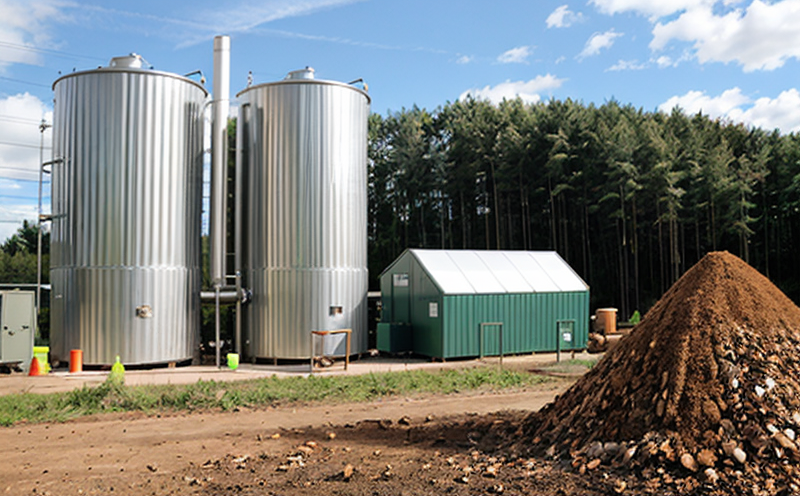ISO 18122 Ash Content in Solid Waste-Derived Fuels
The ISO 18122 standard provides a method to determine the ash content of solid waste-derived fuels (SWDF). This testing is crucial for quality assurance and compliance, particularly in sectors dealing with energy production from waste materials. By accurately measuring the ash content, laboratories like ours ensure that SWDF meets the necessary specifications required for efficient combustion processes.
SWDF plays a pivotal role in waste-to-energy conversion and biomass utilization strategies. This type of fuel is derived from municipal solid waste, industrial by-products, or agricultural residues, among other sources. The ash content directly impacts the performance and efficiency of energy generation technologies such as gasification, pyrolysis, and combustion-based power plants.
The ash in SWDF can significantly affect the operation of these facilities. High ash content may lead to reduced energy output, increased wear on plant components, and higher maintenance costs. Conversely, low ash content ensures optimal performance, enhances operational efficiency, and reduces emissions. By adhering to ISO 18122 standards, laboratories contribute to more sustainable and efficient waste management practices.
The testing process involves several key steps: sample preparation, ash determination, and analysis. Sample preparation is critical for ensuring accurate results. This includes homogenization of the SWDF to ensure a representative sample, followed by drying at specific temperatures to remove moisture content. The subsequent step in determining ash content is incineration in an oven set to 500°C ± 10°C until constant weight is achieved.
Accurate and consistent testing adheres to international standards, which ensures reliability and comparability of results across different laboratories. Compliance with ISO 18122 helps in maintaining the quality of SWDF products for various end-use applications. This standard not only benefits the manufacturing sector but also supports environmental initiatives by promoting cleaner energy solutions.
In summary, ISO 18122 is an essential tool for ensuring that solid waste-derived fuels meet specific ash content requirements. By conducting this test accurately and consistently, laboratories play a vital role in supporting sustainable waste management practices and improving the overall efficiency of waste-to-energy processes.
Scope and Methodology
The ISO 18122 standard outlines the procedure for determining ash content in solid waste-derived fuels. The methodology involves precise sample preparation, ash determination, and analysis steps to ensure accurate results. This process is critical for ensuring that SWDF meets specified quality standards.
- Sample Preparation: Homogenization of SWDF followed by drying at 103°C ± 2°C until constant weight is achieved.
- Ash Determination: Incineration in an oven set to 500°C ± 10°C until the sample reaches a constant weight.
- Analysis: Comparison of initial and final weights to calculate ash content as a percentage by mass.
The accuracy of these steps is paramount. Deviations in any part of this process can lead to unreliable results, impacting both compliance with international standards and operational efficiency at waste-to-energy facilities.
Our laboratory adheres strictly to ISO 18122 guidelines to provide reliable and consistent ash content determinations. This ensures that SWDF products meet the necessary specifications for efficient combustion processes and contribute positively to sustainable waste management practices.
Customer Impact and Satisfaction
- Improved Quality Assurance: By adhering to ISO 18122 standards, we ensure that our clients receive accurate ash content measurements. This leads to higher-quality SWDF products suitable for energy production.
- Enhanced Compliance: Our testing services help clients meet regulatory requirements and industry specifications, reducing the risk of non-compliance penalties.
- Increased Operational Efficiency: Accurate ash content data allows facilities to optimize combustion processes, leading to better fuel utilization and reduced operational costs.
- Better Environmental Stewardship: By supporting sustainable waste management practices, we contribute to a cleaner environment through more efficient energy production from waste materials.
Our commitment to quality and accuracy ensures customer satisfaction. We continuously strive to provide reliable results that support our clients' compliance needs and operational goals.
Environmental and Sustainability Contributions
The ISO 18122 ash content testing is integral to sustainable waste management practices. By ensuring SWDF meets specific quality standards, we contribute to more efficient energy production from waste materials. This not only reduces the environmental impact of waste disposal but also supports broader sustainability goals.
- Reduced Landfill Waste: Efficient utilization of SWDF through accurate ash content testing helps divert waste from landfills, reducing associated environmental impacts.
- Cleaner Energy Production: Accurate ash content data ensures optimal fuel quality for energy production processes, leading to cleaner and more efficient energy generation.
- Better Resource Utilization: By supporting the conversion of waste into valuable fuels, we promote better resource management and reduce reliance on virgin materials.
Our laboratory's adherence to ISO 18122 standards plays a crucial role in advancing sustainable practices. Through precise testing, we help our clients contribute positively to environmental sustainability while also supporting regulatory compliance and operational efficiency.





